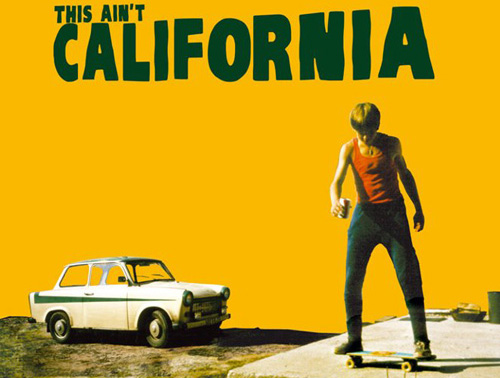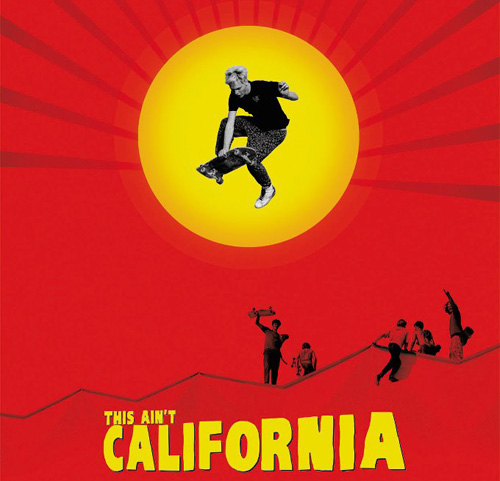
It may have a vague title (…most skate scenes are not California), but This Ain’t California is a detailed pseudo-documentary about a crossroads of recent world history and lesser-known local skate lore.
Marten Persiel’s tale centers around Denis “Panik” Paraceck and his 1980s skate crew in the German Democratic Republic, the portion of Germany that was a Soviet satellite state until 1990. The story is told through Panik’s friends as they gather to reminisce in 2011 upon learning he was killed as a soldier in Afghanistan. This Ain’t California is seemingly presented as fact through old footage, modern interviews and animation sequences, but the viewer suspects the main character may not have existed early on in the film, due to “archival” footage that is a bit too-good-to-be-true, and several obviously scripted moments. Some Googling will reveal that the character of Panik is played by German model and skater, Kai Hillebrandt, and that the film is a blend of both reenactments and real home movies.
Though Panik is fictionalized, he is a composite character found in any skate crew out there — the hometown hero who will try the gnarliest trick to further his legend, who could be good at just about anything but chooses to skate, often to the chagrin of parents. (Even superficially, one would think the actor’s resemblance to Natas Kaupas was part of the casting decision.) Denis Paraceck may not be real, but every skater knows someone like him.

At Panik’s helm, skateboarding turns into a subversive act in the eyes of the Stasi, East Germany’s ministry of state security. The architecture of Alexanderplatz, an incline-heavy plaza in East Berlin, burgeons a large skate scene that undermines a socialist culture that does not believe city plazas are for “play” or creativity. The Stasi begins an investigation of the skaters, assuming they are a threat to “order,” and even tries to corral Panik and his friends into an organized league after realizing skating’s potential of influencing the youth. The skaters unintentionally create their own culture of resistance, even if they are nonpolitical to the point where the only difference they see between East and West Berlin is that the west has a skate shop.
The film is heavy with nostalgia, and carries a tone that would be relatable to anyone who’s looked back on skating as a teenager among longtime friends. The narrators never afford skateboarding any gratuitous celebration; it was something they gravitated to simply because “children like rolling things.” In less delicate hands, This Ain’t California may have overblown the resistance aspect of skateboarding in the GDR and how nobody else “understood” skate culture. Instead, it keeps things matter of fact: they aren’t rebels trying to be special, they are kids trying to have fun. They just happen to do it under a totalitarian regime. Any presumed threats to social order remain insignificant when compared to the familiar milestones they experience — the first trip to the famous spot, the first coverage their friend gets in a magazine, or fanning out when first meeting the pro they idolize.
There is no preachy analysis, and Persiel resists handing out the pats on the back that skaters love to give when making documentaries about themselves. Even semi-fictionalized skate history is best served as a collection of fondly recollected stories, rather than skaters waxing on about how differently they “see the world.”
This is not to say that This Ain’t California has no concern in the value of skateboarding and the relationships it fosters, just that the film never overstates either one. Some reviews believe the documentary format does the audience a disservice by embellishing a crucial time in German history, even when parts of the story are rooted in truth. However, it seems less intent on being a historical account of GDR life, and more interested in the universality of growing up on a skateboard, with East Berlin as a mere backdrop. Remember, skateboarding is still (at the very least) frowned upon in public spaces throughout the world. The socialists of the GDR were no less tolerant than the municipalities who continue to outlaw skateboarding in 2013, so the truthfulness of the film’s possibly-fictional characters’ adolescence seems irrelevant. All skaters share some variation of these experiences with them.
The film had a short run at Harlem’s Maysles Institute in April. No sign of when it will resurface again in the U.S. There’s a German DVD of it that has English subtitles available on (German) Amazon though. Check its Facebook page for updates.





